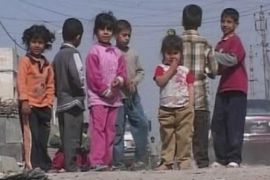Forgotten children of Baghdad
Children find little solace as Iraq marks fourth anniversary of the fall of Baghdad.

 |
| Many children in Baghdad are forced to survive on the streets |
Four years on since the US invasion, many of the people who continue to suffer the most in Iraq are the country’s children.
Many have lost their families to the violence and are forced to live on the streets in the midst of a war, surviving by living in dumps and eating whatever scraps they can find.
Poverty in Iraq has reached new levels in the last four years. Many children have little or no access to basic necessities, like clean water, health care or education.
The statistics are startling. One child in every 25 will die before they reach the age of five. One in four, or more than three million children, are malnourished and one in five does not go to school.
Al Jazeera spoke to some of the forgotten victims of the war in Iraq.
 |
| Ahmed Jabbar |
Ahmed Jabbar spends his days selling toys on the streets of Baghdad. He left school because he needed to earn a living for his brothers and sisters.
“Our family has seven members,” he says. “My father was killed by a terrorist in Baquba. We left Baquba and came to Baghdad.”
Both of Sijad Ali’s parents died when he was just five. He lived on the streets until his brothers took him to an orphanage in Tobji. Here he can paint and play games with his friends and is considered the lucky ones.
“The National Guards and the Americans used to beat and arrest me, suspecting I was a terrorist. No matter how much I told them I wasn’t. Then I ended up here. It’s a comfortable place and we have full rights.”
 |
| Sijad Ali |
Another child at the orphanage is Mohammed Wahel. The orphans are often dumped on the doorstep of the safe house.
“I’m from Basra and I was brought to Baghdad by a man and left in the street,” he says. “I stayed with a family and then I was brought to the orphanage. I don’t know who my parents are.”
“Children here lack family feelings and passion,” says Sumir Jasse, a social worker at the orphanage. “We love them more than their parents do. We try to bring happiness to their life. We stay with them day and night, we treat them and work hard to cure those who were subject to being beaten in the past.”